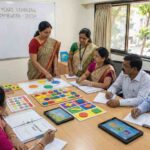The proliferation of EdTech platforms has transformed not only how students learn but also how parents perceive and evaluate the concept of “quality education.” Traditionally, quality education was defined by factors such as well-qualified teachers, robust school infrastructure, and a balanced curriculum. However, with the rise of EdTech, this definition is evolving, driven by technology’s promise of personalized learning, skill acquisition, and measurable outcomes.
While these changes have introduced opportunities for enhanced learning, they have also brought new challenges, raising questions about the balance between technology-driven education and traditional methods.
Redefining Quality Education Through EdTech
- Emphasis on Personalized Learning:
- Traditional Perception: Parents historically evaluated quality education based on standardized teaching and uniform curricula.
- Post-EdTech Shift: Platforms offering adaptive learning paths and AI-driven insights have reshaped this perspective. Many parents now see personalized learning experiences, tailored to their child’s pace and strengths, as a hallmark of quality education.
- Outcome-Oriented Evaluation:
- Traditional Perception: Success was measured through annual school grades and holistic development.
- Post-EdTech Shift: The ability to track real-time progress, test scores, and module completion on EdTech platforms has shifted focus to quantifiable, short-term achievements. Parents increasingly associate frequent progress reports and skill certifications with quality education.
- Skill-Based Learning Over Traditional Curricula:
- Traditional Perception: Emphasis was placed on mastering academic subjects as outlined by school boards (e.g., CBSE, ICSE, or state boards in India).
- Post-EdTech Shift: Platforms offering courses on coding, robotics, creative writing, and entrepreneurship have popularized the idea that skill acquisition outside traditional curricula is essential for future success. Parents now view these “market-ready” skills as integral to quality education.
- Accessibility and Convenience:
- Traditional Perception: Physical school infrastructure and extracurricular offerings were primary indicators of quality education.
- Post-EdTech Shift: The convenience of learning from home, flexible schedules, and access to global resources through EdTech platforms has redefined accessibility as a critical component of quality education. For many parents, a virtual classroom that offers a wide array of options rivals or surpasses the benefits of traditional schooling.
- Global Benchmarks and Exposure:
- Traditional Perception: Quality education was assessed based on national standards and the school’s reputation within a local context.
- Post-EdTech Shift: With EdTech platforms offering international curricula and global teaching standards, parents are increasingly aligning their perception of quality education with global benchmarks, pushing schools to adapt to these expectations.
Shifting Parental Expectations
- Demand for Transparency and Data:
- Parents now expect detailed analytics on their child’s performance, including strengths, weaknesses, and areas for improvement. This shift has introduced an expectation for schools and educators to match the level of transparency offered by EdTech platforms.
- Pressure for Immediate Results:
- The availability of real-time feedback on EdTech platforms has led parents to expect quicker and more visible improvements in their child’s academic performance, placing additional pressure on both students and traditional educators.
- Integration of Technology in Schools:
- Schools without significant technological integration are increasingly viewed as outdated or less effective. Parents now expect educational institutions to complement traditional methods with EdTech-driven tools and platforms to meet modern standards.
- Increased Competition Among Students:
- The competitive metrics, such as leaderboards and rankings, offered by EdTech platforms have heightened parental awareness of their child’s performance relative to others, fostering a competitive environment that extends beyond school.
Challenges in the New Perception of Quality Education
- Overemphasis on Metrics:
- Parents may equate quality education with tangible outputs like certifications, badges, and scores, potentially sidelining soft skills, critical thinking, and emotional intelligence.
- Digital Divide:
- Families from lower socio-economic backgrounds may struggle to access EdTech platforms due to high costs or lack of digital infrastructure, creating disparities in perceptions and opportunities for quality education.
- Reduction of Holistic Development:
- The focus on skill-based and outcome-oriented learning could lead to neglect of extracurricular activities, arts, and physical education, which are vital for holistic growth.
- Parental Over-Involvement:
- With the ability to monitor every aspect of their child’s learning journey, some parents may micromanage or place undue pressure on students, affecting their independence and confidence.
Balancing EdTech and Traditional Values
To ensure that the evolving perception of quality education incorporates the best of both worlds, a balanced approach is necessary:
- Holistic Metrics:
- EdTech platforms and schools should work together to present a more balanced view of progress that includes academic results, soft skills development, creativity, and emotional well-being.
- Parental Awareness Programs:
- Schools and platforms should educate parents on the importance of holistic education and the risks of over-relying on metrics or certifications as sole indicators of success.
- Hybrid Learning Models:
- Integrating EdTech into traditional education systems can provide students with personalized learning while retaining the benefits of social interaction, collaboration, and community engagement offered by schools.
- Focus on Lifelong Learning:
- Parents should be encouraged to view education as a lifelong process rather than a race for immediate results, helping reduce the pressure on students to achieve constant visible progress.
- Inclusive Policies:
- Governments and institutions must address the digital divide by providing affordable access to EdTech resources, ensuring that quality education is not exclusive to those with financial and technological means.
Conclusion
EdTech has undeniably redefined how parents perceive quality education in India, emphasizing personalized learning, measurable outcomes, and skill acquisition. While this shift has introduced new opportunities, it has also created pressures that could narrow the focus of education and sideline essential values like creativity, critical thinking, and emotional well-being. Striking a balance between the technological advancements of EdTech and the holistic principles of traditional education will be key to nurturing a generation that is not only skilled but also well-rounded and resilient.













